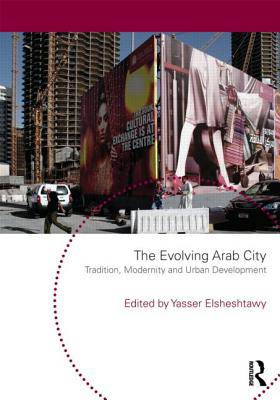
- Retrait gratuit dans votre magasin Club
- 7.000.000 titres dans notre catalogue
- Payer en toute sécurité
- Toujours un magasin près de chez vous
- Retrait gratuit dans votre magasin Club
- 7.000.000 titres dans notre catalogue
- Payer en toute sécurité
- Toujours un magasin près de chez vous
The Evolving Arab City
Tradition, Modernity and Urban Development
Description
"This outstanding collection, written by sophisticated and engaged Arab architects/urbanists, is a stunning sequel to Planning Middle Eastern Cities (2004) Like its predecessor, it does three things: effectively demolishes the monopoly 'orientalists' had over the topic; integrates grounded Arab scholarship with mainstream 'western' critical urban theory; and, by detailing the diverse ways Arab cities are responding to globalization, challenges oversimplified debates on 'The Global City'.
Studies of Arab/Islamic cities used to be the province of 'outsiders' who not only prematurely generalized to a genre, but encapsulated it in timelessness. In contrast, the case studies included in the earlier volume (Dubai, Sana'a, Baghdad, Algiers, Tunis, and Cairo), now supplemented in this volume by three older cities (Amman, Beirut, and Rabat) and five newer oil cities (Riyadh, Kuwait City, Manama, Doha and Abu-Dhabi), focus, often critically, on their rapid transformations.
Each case study traces its colonial and post-colonial history, the evolution of its distinctive social and physical structures, and its intersection with the region and the world. It pays particular attention to, inter alia, the effects of recent wars, migration patterns, petroleum prices, noting the increased role of 'rulers' in city planning/real estate investment both within and between Arab countries. Each traces the increased interactions between multinational firms and local developers as they strategize and compete to elevate themselves to global city status. Neoliberalism and State-sponsored advanced capitalism are all implicated in the painful task of balancing identity and post-modernity.
A must read!" - Janet Abu-Lughod, Professor Emerita, Northwestern University and The Graduate Faculty, New School for Social Research, USA
Winner of The International Planning History Society (IPHS) Book Prize.
Spécifications
Parties prenantes
- Editeur:
Contenu
- Nombre de pages :
- 328
- Langue:
- Anglais
- Collection :
Caractéristiques
- EAN:
- 9780415665728
- Date de parution :
- 23-02-11
- Format:
- Livre broché
- Format numérique:
- Trade paperback (VS)
- Dimensions :
- 173 mm x 244 mm
- Poids :
- 616 g






